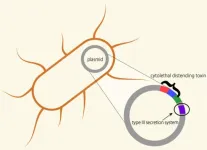(Press-News.org) Picture this: You’re shopping online for this week’s groceries. You try to pick healthy options based on the information provided by the online retailer. You can tell that the products you’re choosing are organic, non-GMO, or Fair Trade Certified. But in many cases, you can’t find the nutrition facts, ingredient list, or even a list of allergens.
A new, comprehensive study of online grocery retailers shows this problem is pervasive, to the detriment of public health and safety in the U.S. The study, led by researchers at the Friedman School of Nutrition Science and Policy at Tufts University and published in Public Health Nutrition on Oct. 17, shows a lack of present, accessible, and legible information about the food consumers buy, while marketing claims are still prominent. The absence of accessible food labeling has tangible consequences for public health, said Julia Sharib, first author on the study and manager of research and communications for the Food is Medicine Institute at the Friedman School.
“The government has clearly intended that you should be able to know certain things about your food,” said Sean Cash, Bergstrom Foundation Professor in Global Nutrition at the Friedman School and senior author on the study. “The way we’ve regulated that in the United States is to put that information on the packaging. But that hasn’t carried over to online spaces very well.”
A Lack of Information
Cash and researchers at the Friedman School and New York University (NYU) first identified the lack of accessible food labeling among online retailers in a 2022 pilot study of 10 food products across nine online grocery retailers. That study found that information required by the Food and Drug Administration (FDA) about food, such as nutrition facts, an ingredient list, and an allergen list were often absent, and were less present than marketing claims.
The lack of information accessible in online settings reveals a “major gap” in federal regulations, Cash said. While food manufacturers are required by the FDA to present certain information on food packaging, online grocery retailers aren’t required to reproduce that information on their websites. That means that consumers won’t necessarily be able to access information about calories, nutrition content, or allergens when buying their groceries online.
Since 2022, there were some reasons to think that retailers would step up their game. First, online grocery shopping is here to stay—recent data from the U.S. Department of Agriculture (USDA) indicates that 20% of Americans buy their groceries online, while over 80% have done so in the past three years. The trend has been aided by a drop in online food prices relative to in-store shopping: Prices are now roughly comparable between in-store and online groceries, which hasn’t always been the case.
Second, online food retailers could have responded to the growing market by deciding to get out ahead of any regulatory action. “We thought there might be practical changes in what food retailers are doing,” Cash said.
There have been signs that the FDA is considering regulatory action, too. In 2023, the agency issued a request for information on food labeling in online grocery shopping, citing previous research from Cash and his colleagues as one basis of their request. “We, and others, have been pushing for change,” Cash said. But the agency has not yet taken regulatory action to close the gap.
The new study, with co-authors Jennifer Pomeranz, associate professor of public health policy and management at the NYU School of Global Public Health, and Dariush Mozaffarian, director of the Food is Medicine Institute and Jean Mayer Professor of Nutrition at the Friedman School, gives a more complete look at the issue and analyzes 60 food products across 10 different online grocery retailers. The food products were chosen to represent the typical range of food commonly sold at supermarkets, based on a formula used by the USDA for administering food assistance programs. The results show the trend has persisted: Each FDA-required label was present, accessible, and legible for just 35.1% of products.
Marketing claims and labels, though, were present for 83.7% of products. That’s what Cash finds unpalatable. “It’s far easier to find marketing that’s trying to sell you the food rather than the information that our society agrees should be there to tell you about your food,” he said.
“We saw many cases in which a nutrition facts label, for example, was only accessible after scrolling through a dozen marketing images, essentially forcing any consumers seeking that label to interact with marketing language,” Sharib said.
Making Shopping More Accessible
Studies show that population health is better when ingredient lists and nutrition facts are provided. When consumers can’t access that information, retailers “run the risk of perpetuating consumer’s incorrect understandings about the healthfulness of the foods they buy,” Sharib said.
Additionally, plenty of Americans follow specific diets meant to control certain health conditions and may be looking for foods with a specific nutrition content. “For example, if you’re worried about sodium intake because you have hypertension, food labeling is something that can be a very important part of your life,” Cash said. For people with specific allergies, a lack of food labeling can be dangerous, too.
The best way consumers can get the FDA-required information is to visit the websites of the food manufacturers themselves, Cash said. On those sites, nutrition information and ingredient lists are much more likely to be present and legible. Cash cautions that food labeling found in product reviews can be helpful, but may also be out of date or inaccurate.
And ultimately, the onus should be on regulators and the industry to provide important information to consumers, Cash said. “Putting the burden on consumers is not what we should be doing,” he said.
There are a few solutions: First, regulators or congress could pass new laws or issue new regulations to compel food retailers to make food labeling accessible. Second, the U.S. government could help online retailers to make food labeling accessible by providing a public database of nutrition, ingredient, and allergen information of packaged foods, Cash said.
“We simply cannot continue to let this sector grow without modern regulation,” Sharib said.
Research reported in this article was supported by the National Heart, Lung, and Blood Institute at the National Institutes of Health under award R01HL115189. Complete information on authors, funders, and conflicts of interest is available in the published paper. The content is solely the responsibility of the authors and does not necessarily represent the official views of the funders.
END
Buy your groceries online? Watch out for this food labeling gap
Online grocery shopping has soared in popularity, but new Friedman School of Nutrition Science and Policy research shows food information—like nutrition facts, ingredients, or allergens—isn’t always accessible to consumers
2024-10-17
ELSE PRESS RELEASES FROM THIS DATE:
Etcembly and University of Surrey launch pioneering study to unlock next-generation cancer treatments from survivors
2024-10-17
British techbio innovator Etcembly is teaming up with researchers and clinicians from the University of Surrey to launch a groundbreaking new study that could transform the future of cancer treatment. By analysing the immune cells of cancer survivors, this research is set to reveal untapped targets that could deliver the next generation of immunotherapies.
In recent years, treatments that harness a patient’s own immune system to fight cancer have become a key pillar of oncology. However, these drugs don’t work for all, and a wider range of novel immunotherapies is urgently needed.
T ...
City microbes surviving on disinfectants, research reveals
2024-10-17
After the recent pandemic, our use of disinfectants has increased, but are our efforts to create sterile urban environments backfiring?
A new study published in the journal Microbiome has identified novel strains of microbes that have adapted to use the limited resources available in cities and shown that our everyday behaviour is changing the makeup of microorganisms in indoor environments.
“Built environments offer distinct conditions that set them apart from natural and engineered habitats,” says Dr Xinzhao Tong, an assistant professor at Xi’an Jiaotong-Liverpool University (XJTLU), China, and lead author ...
Sleeping for 2: CBT for insomnia combats postpartum depression
2024-10-17
Cognitive behavioural therapy for insomnia (CBTI) delivered during pregnancy significantly reduces postpartum depressive symptoms in mothers, new research from UBC shows.
Researchers from the Vancouver and Okanagan campuses investigated whether treating insomnia during pregnancy could alleviate symptoms of postpartum depression, which affects many new mothers.
“Early intervention is crucial for infant and maternal mental health,” says Dr. Elizabeth Keys, an Assistant Professor in UBCO’s School of Nursing and study co-author. “Our research explores how addressing sleep problems, like insomnia, can lead to ...
Financial incentive encourages healthiness: why isn't it used more often?
2024-10-17
Move more, quit smoking, lose weight: great resolutions, hard to keep. But does it get easier if there is a financial incentive in return? According to research by Radboud University and others, it can be an effective tool, although there are still some obstacles. They presented their findings this week in Economisch Statistische Berichten (ESB).
Some lifestyle interventions are more effective than others, but in general, financial incentives are a ‘powerful tool to help reduce health inequalities in the Netherlands’, says Koen van der Swaluw of Radboud University. Despite knowing more and more about the effectiveness of financial incentives to promote ...
People sympathize with bullied AI bots
2024-10-17
In an Imperial College London study, humans displayed sympathy towards and protected AI bots who were excluded from playtime.
The researchers say the study, which used a virtual ball game, highlights humans' tendency to treat AI agents as social beings – an inclination that should be considered when designing AI bots.
The study is published in Human Behavior and Emerging Technologies.
Lead author Jianan Zhou, from Imperial’s Dyson School of Design Engineering, said: “This is a unique insight into how humans interact ...
Providencia rustigianii has virulence gene akin to Salmonella’s
2024-10-17
Salmonella and E. coli are well-known bacteria that cause food poisoning, but less understood are species of Providencia, another causative agent of serious symptoms. Providencia rustigianii, isolated from pediatric gastroenteritis patients, has now undergone whole genome sequencing by a research team led by Osaka Metropolitan University Professor Shinji Yamasaki of the Graduate School of Veterinary Science and the Osaka International Research Center for Infectious Diseases.
Members of the team had previously reported that P. rustigianii carries a cytolethal distending toxin virulence gene on its plasmid. Elimination of this gene did not ...
Ozempic (and similar medications) may be the new treatment for opioid and alcohol use disorder
2024-10-17
A new study published in the scientific journal Addiction has found that people with opioid or alcohol use disorder (OUD, AUD) who take Ozempic or similar medications to treat diabetic/weight-related conditions appear to have a 40% lower rate of opioid overdose and a 50% lower rate of alcohol intoxication than people with OUD and AUD who do not take Ozempic or similar medications.
Ozempic is one of several medications, called glucagon-like peptide-1 receptor agonists or GLP-1 RAs, that are prescribed to treat diabetes, obesity, and other weight-related medical conditions. The medications interact with ...
Artificial nests boost penguin breeding success, but there’s no one-size-fits-all design
2024-10-17
Artificial nests can boost the breeding success of endangered African penguins, but different designs are more effective at different colonies according to a new study by an international team of researchers from South Africa and the UK. The findings are published in the British Ecological Society journal, Ecological Solutions and Evidence.
A new study, led by researchers at Nelson Mandela University, which monitored the breeding success of African penguins for 12 years across South Africa has found that artificial ...
Study: Pediatric healthcare facilities need more staff dedicated to infection prevention
2024-10-17
Arlington, Va. — October 17, 2024 — A new paper published today in the American Journal of Infection Control (AJIC) describes efforts at a major children’s hospital to assess and fulfill its staffing needs for infection prevention and control, highlighting the challenges of allocating sufficient resources to this important role. Infection preventionists (IPs) at Boston Children’s Hospital found that conventional methods for calculating the number of staff for these roles do not accurately reflect the current needs of healthcare systems or the specific needs of a pediatric ...
Marine experts challenge reliability of vessel strike prediction models
2024-10-17
A new study has raised questions about current approaches to predicting the risk of vessel strikes on whales.
Led by researchers at Heriot-Watt University in Edinburgh, Scotland, an international team of scientists compared eight models currently in place to assess and forecast the risk of ships colliding with whales. The study reveals notable inconsistencies in the results across the different models.
Most reports of vessel collisions involve large whales but all species can be affected. Globally, strikes are under-reported and can often go undetected, particularly when they involve large vessels. Collisions can result in animals being injured or killed, and vessels ...
LAST 30 PRESS RELEASES:
The Lancet: First-ever in-utero stem cell therapy for fetal spina bifida repair is safe, study finds
Nanoplastics can interact with Salmonella to affect food safety, study shows
Eric Moore, M.D., elected to Mayo Clinic Board of Trustees
NYU named “research powerhouse” in new analysis
New polymer materials may offer breakthrough solution for hard-to-remove PFAS in water
Biochar can either curb or boost greenhouse gas emissions depending on soil conditions, new study finds
Nanobiochar emerges as a next generation solution for cleaner water, healthier soils, and resilient ecosystems
Study finds more parents saying ‘No’ to vitamin K, putting babies’ brains at risk
Scientists develop new gut health measure that tracks disease
Rice gene discovery could cut fertiliser use while protecting yields
Jumping ‘DNA parasites’ linked to early stages of tumour formation
Ultra-sensitive CAR T cells provide potential strategy to treat solid tumors
Early Neanderthal-Human interbreeding was strongly sex biased
North American bird declines are widespread and accelerating in agricultural hotspots
Researchers recommend strategies for improved genetic privacy legislation
How birds achieve sweet success
More sensitive cell therapy may be a HIT against solid cancers
Scientists map how aging reshapes cells across the entire mammalian body
Hotspots of accelerated bird decline linked to agricultural activity
How ancient attraction shaped the human genome
NJIT faculty named Senior Members of the National Academy of Inventors
App aids substance use recovery in vulnerable populations
College students nationwide received lifesaving education on sudden cardiac death
Oak Ridge National Laboratory launches the Next-Generation Data Centers Institute
Improved short-term sea level change predictions with better AI training
UAlbany researchers develop new laser technique to test mRNA-based therapeutics
New water-treatment system removes nitrogen, phosphorus from farm tile drainage
Major Canadian study finds strong link between cannabis, anxiety and depression
New discovery of younger Ediacaran biota
Lymphovenous bypass: Potential surgical treatment for Alzheimer's disease?
[Press-News.org] Buy your groceries online? Watch out for this food labeling gapOnline grocery shopping has soared in popularity, but new Friedman School of Nutrition Science and Policy research shows food information—like nutrition facts, ingredients, or allergens—isn’t always accessible to consumers




